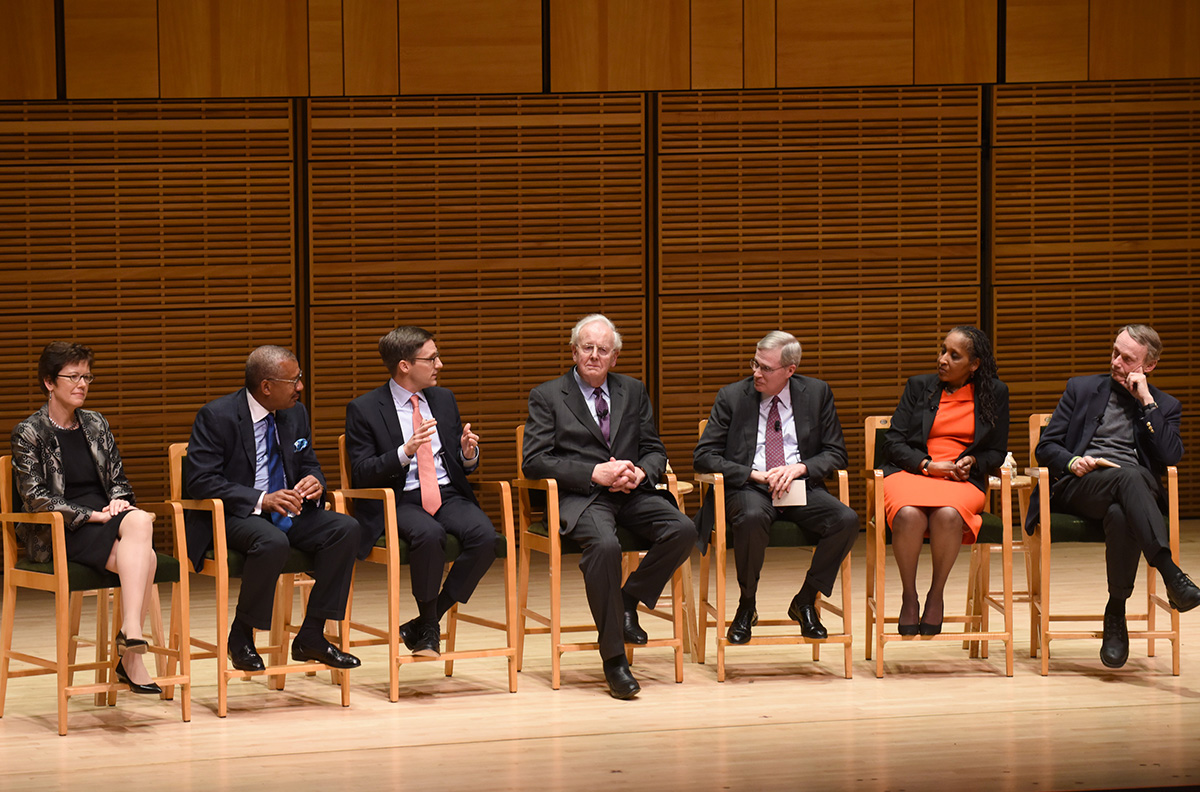Legacy of Cornell-led diplomacy detailed at Carnegie Hall
By Jon Craig

More than 500 fans of American history and of a pair of Cornell professors who are keeping it alive got a lesson in global policy March 8.
The evening began with Cornell Professor Emeritus Walter LaFeber detailing the roles early Cornell presidents and professors played in shaping foreign affairs in the late 1800s and through World War II.
LaFeber called Cornell “the best place to teach the kind of history ... that I believe in.”
LaFeber, the Andrew H. and James S. Tisch Distinguished University Professor Emeritus and a Stephen H. Weiss Presidential Fellow, then kicked off a lively talk with Cornell professor Peter Katzenstein and alumni who put their studies to practice.
Katzenstein, the Walter S. Carpenter Jr. Professor of International Studies in Cornell’s Department of Government, described “critical realignment” periods in history where experts look back and see what early events shaped major milestones. The latest critical realignment began in 2008 with the economic crash, which, in Katzenstein’s opinion, helped get President Obama elected.
How the 2016 presidential race turns out may help determine when the current realignment period ends, Katzenstein said. He said Donald Trump is “bringing people into politics who have not been in politics.”
U.S. Ambassador Dwight Bush ’79 said Cornell had a “profound impact” on him, from the diversity it offered among students to his experiences working as a residential hall adviser. “I show up at Cornell and start to meet scholars,” Bush recalled. “If I had not had the Cornell experience, it’s highly unlikely I’d be where I am today.”
Bush is U.S. ambassador to the Kingdom of Morocco. He said majoring in government and economics at Cornell gave him an appreciation for critical thinking and working as an R.A. gave him key people skills.
Derek Chollet ’93, author of “The Long Game: How Obama Defied Washington and Redefined America’s Role in the World” and a senior Pentagon adviser for four years during the Obama administration, pointed out that his classes with LaFeber and Katzenstein, combined with his participation in the Cornell in Washington Program in 1992, were “indispensable to my understanding of foreign policy but also to my career.”
Stephen Hadley ’69, national security adviser to President George W. Bush, credited LaFeber “with bringing a whole generation of people” into public service. Hadley, a government major, said Katzenstein taught him “our country is run by institutions,” not its leaders, and that lesson became very real to him while advising Bush about Iraq. Hadley was appointed in 2005 when the political climate in the Middle East was “Vietnam II,” according to Hadley. As a Cornell student during the late 1960s, Hadley studied the Vietnam War extensively and witnessed campus turmoil. Hadley said he wished he had taken more economics courses and a lot more history courses while at Cornell.
In addition to her strong academic experience as a double major, Makila James ’79 said her involvement with Cornell’s Africana Studies and Research Center shaped her career choices. James served as U.S. ambassador to the Kingdom of Swaziland from 2012 to 2015.
The panel discussion was followed by a question-and-answer session. Asked about the current division between political parties and government in general, Hadley said he was recently in Israel. In that country, despite divided opinions among its leaders, Hadley said, “There is presumption of good faith” following heated debates. “I think we’ve lost the presumption of good faith.”
The event was hosted by the College of Arts and Sciences. Gretchen Ritter ’83, the college’s Harold Tanner Dean, introduced the panel at Carnegie Hall’s Zankel Hall.
Jon Craig '80 is a journalist based in Westchester County, New York.
Media Contact
Get Cornell news delivered right to your inbox.
Subscribe